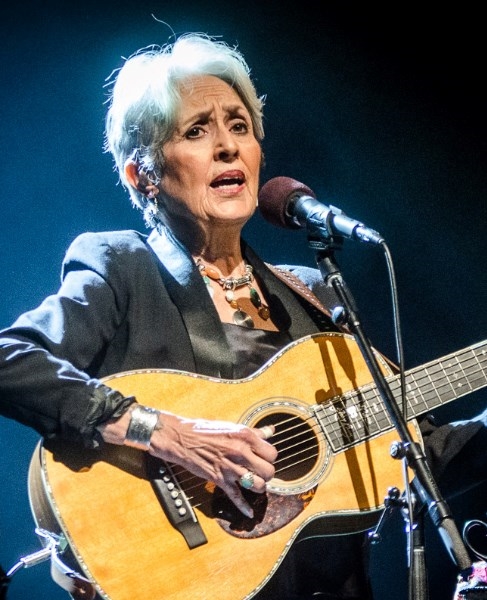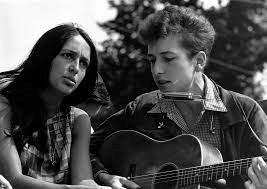Joan Baez, an iconic folk singer, songwriter, and activist, has left an indelible mark on the music industry and the world at large. With her incredible voice and unwavering commitment to social justice, Baez became a prominent figure in the folk music revival of the 1960s and has continued to inspire generations with her powerful music and advocacy.
Joan Chandos Baez was born on January 9, 1941, in Staten Island, New York, to a family of Mexican and Scottish descent. Raised in a musically inclined household, Baez developed an early interest in folk music, drawing inspiration from artists like Pete Seeger and Woody Guthrie. She began playing the guitar at a young age and started performing in local clubs and coffeehouses during her teenage years.
 Joan BaezWiki CommonsBaez rose to fame in the early 1960s as part of the burgeoning folk music scene. Her self-titled debut album, released in 1960, featured traditional folk songs and showcased her extraordinary vocal range. Baez's ability to convey deep emotions through her singing, combined with her commitment to authenticity, quickly garnered attention and admiration.
Joan BaezWiki CommonsBaez rose to fame in the early 1960s as part of the burgeoning folk music scene. Her self-titled debut album, released in 1960, featured traditional folk songs and showcased her extraordinary vocal range. Baez's ability to convey deep emotions through her singing, combined with her commitment to authenticity, quickly garnered attention and admiration.
Baez became a leading figure in the folk music revival, and her second album, "Joan Baez, Vol. 2" (1961), solidified her status as a rising star. The album included her breakthrough rendition of Bob Dylan's "Don't Think Twice, It's All Right," which not only introduced her to a broader audience but also marked the beginning of her association with Dylan.
Collaboration with Bob Dylan:
Baez and Bob Dylan became synonymous with the 1960s folk music movement. Their personal and professional relationship played a significant role in shaping both of their careers. Baez's support of Dylan during his early years contributed to his success, while Dylan's influence on Baez expanded her musical horizons. Their duets, such as "With God on Our Side" and "It Ain't Me Babe," showcased a powerful musical chemistry that captivated audiences.
 Baez and DylanFlikrActivism and Social Justice:
Baez and DylanFlikrActivism and Social Justice:
Beyond her musical achievements, Joan Baez is renowned for her unwavering commitment to social justice and activism. Inspired by her involvement in the Civil Rights Movement, Baez used her platform to address issues of racial inequality and advocate for peace. She actively participated in protests against the Vietnam War, leading to her arrest on multiple occasions.
Baez's dedication to nonviolent activism and her willingness to use her voice to promote change made her an influential figure in the protest movements of the 1960s. Her performances at events like the 1963 March on Washington for Jobs and Freedom, where she sang "We Shall Overcome," solidified her role as a key figure in the fight for civil rights.
Later Career and Legacy:
Joan Baez continued to release critically acclaimed albums throughout her career, exploring a range of musical styles beyond folk. Her repertoire includes interpretations of songs by contemporary artists and her own compositions, showcasing her evolution as an artist. Notable albums include "Diamonds & Rust" (1975) and "Dark Chords on a Big Guitar" (2003).
In 2018, Baez embarked on her farewell tour, marking the end of her touring career. The tour, titled "Fare Thee Well," celebrated her six-decade-long career and allowed fans around the world to bid farewell to a musical legend.
Joan Baez's legacy extends far beyond her musical accomplishments. Her advocacy for social justice, commitment to pacifism, and fearless approach to activism have inspired countless individuals to use their voices for positive change. Whether through the haunting beauty of her music or the impact of her social and political activism, Joan Baez remains a beacon of hope and a symbol of the transformative power of art.
Page created on 1/2/2024 4:15:27 PM
Last edited 1/2/2024 4:28:51 PM
